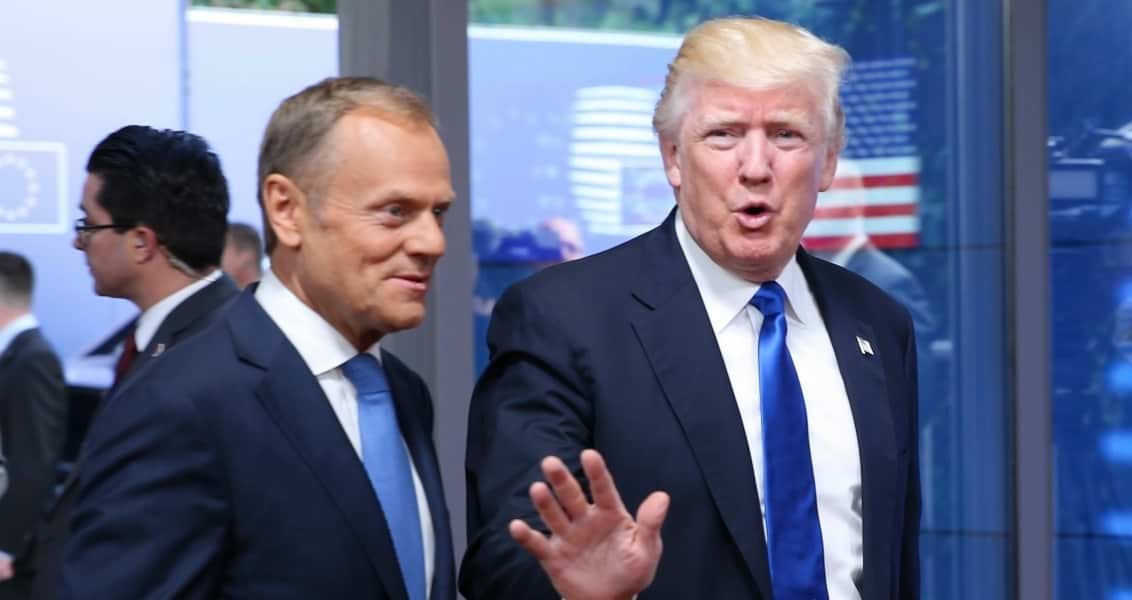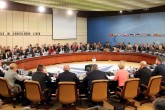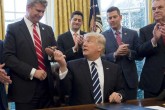Thursday’s NATO summit in Brussels marked a turning point in the Atlantic alliance’s future. The historic meeting, which took place at the organization’s new headquarters, focused on two issues: Counter-terrorism and cost sharing.
For European leaders, the summit represented an opportunity to develop a better understanding of U.S. President Donald Trump’s perspective on NATO. Ahead of the meeting, the million-dollar question for many NATO allies was whether Washington remained fully committed to the alliance – especially because Europe itself deals with serious issues including the implementation of Brexit and maintaining the unity of continental Europe.
To be clear, Emmanuel Macron’s victory in the French presidential election eased fears of a populist takeover and gave German Chancellor Angela Merkel a confidence boost regarding the upcoming election in her country and the prospect of Berlin and Paris leading the European Union after Britain’s departure.
Still, some things have not been forgotten. Many observers still remember that Mr. Trump denied the German chancellor a handshake during her visit to the Oval Office. It is also important to recall that the U.S. president had raised eyebrows by suggesting that NATO was “obsolete” at a campaign event last year. Although he reversed his position on the Atlantic alliance after the inauguration, many European leaders were still wondering whether they would be on the same page as the U.S. leadership.
Meanwhile, Mr. Trump’s trips to Saudi Arabia, Israel and the Vatican suggested that he is indeed becoming more careful and diplomatic. Having dropped the phrase “radical Islamic terrorism” in Saudi Arabia, the U.S. president signaled to Arab leaders that he was prepared to work with them – provided that they were willing to spend hundreds of billions of dollars on U.S. weapons.
Under the circumstances, it was no surprise that the NATO summit was not a complete disaster and instead an opportunity for the U.S. and the European Union to start talking about key issues. Ahead of Thursday’s meeting, the Europeans already knew that Mr. Trump would complain about the fact that Washington supplied over 70 percent of NATO funds and urge his allies to pull their weight. At the same time, the U.S. wants its fellow leaders to contribute more to intelligence-sharing and the war on terror in Afghanistan and Syria. Needless to say, NATO’s potential contributions to the anti-Daesh campaign in the Middle East cannot be separated from the Trump administration’s commitment to isolating Iran.
Making a fresh start with Saudi Arabia and Israel – U.S. allies alienated by Barack Obama – Mr. Trump met with Palestinian leader Mahmoud Abbas and talked about a two-state solution. However, this air of optimism is unlikely to result in the peaceful resolution of the Palestinian conflict. It is far more likely that the Trump administration wants to ease tensions between Israel and the Arab countries in order to sell both sides on the plan to isolate the Iranians – which, in turn, could escalate proxy wars in Yemen, Iraq and Syria.
The fact that Washington targeted Iran-backed militiamen in southeastern Syria supports this claim. In addition to preventing Tehran from gaining control over Deir ez-Zor, the most recent U.S. airstrikes proved that the Trump administration was unwilling to let the Iranians create a militia-enforced corridor that cuts across Iraq and Syria. Moving forward, the U.S. could work with Israel to target Hezbollah for the same purpose.
However, the Gulf countries cannot realistically expect the United States to fight Iran on their behalf. It remains unclear whether Mr. Trump will prioritize the struggle against Iranian expansionism when the time comes – which is why Turkey remains strategically important for the Western alliance. Although the Trump administration approved a plan to arm the People’s Protection Units (YPG), the PKK’s Syrian franchise, ahead of the Raqqa operation, it did not shut the door on working with the Turks to prepare Iraq and Syria for the post-Daesh period. To be clear, it’s not just the Americans that are aware of Turkey’s importance. Almost overnight, European leaders stopped calling for the suspension of membership talks with Turkey and started looking for ways to work with President Recep Tayyip Erdoğan.
What lies ahead for Turkey and the European Union, however, will be the subject of my next column.
[Daily Sabah, May 27, 2017]
In this article
- Foreign Policy
- Opinion
- 2017
- Afghanistan
- Angela Merkel
- Arabian peninsula
- Brexit
- Britain
- Brussel
- DAESH
- Daily Sabah
- Donald Trump
- Emmanuel Macron
- Europe
- European Union (EU)
- French President
- German Chancellor
- gulf
- Hezbollah
- Iraq
- Islam
- Islamic
- Islamic Republic of Iran
- Israel
- Kurdistan Workers' Party Terrorist Organization (PKK)
- Middle East
- NATO
- NATO Summit
- Palestine
- People's Protection Units (YPG)
- PKK - YPG - SDF - PYD - YPJ - SDG - HBDH - HPG - KCK - PJAK - TAK - YBŞ
- Proxy War
- Recep Tayyip Erdoğan
- Saudi Arabia
- Syria
- Syrian Civil War
- Syrian Conflict
- Syrian Crisis
- Terror
- Terrorism
- The President of the Republic of Türkiye
- Trump Administration
- Turkish President
- UK
- United Kingdom (UK)
- United States (US)
- US President
- USA
- Western World
- Yemen



